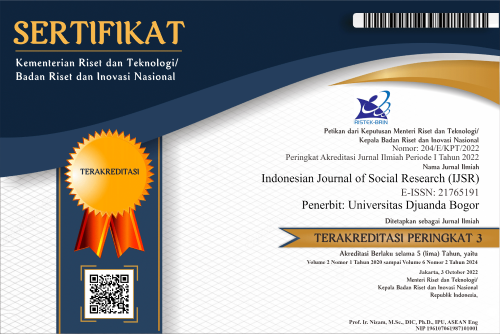World Court's Verdict Towards Bakassi Peninsula: Portraying Gains and Losses
Abstract
Border discords are one of Africa's unending vestiges of European colonialism/imperialism; the Bakassi peninsula dispute between Cameroon and Nigeria was one of such. The subsequent discovery of large deposits of natural resources in the Bakassi region made Cameroon and Nigeria to engage into claims and counterclaims, bilateral diplomacy, military skirmishes, and finally resorting to the World Court or International Court of Justice (ICJ) for judgement. After eight years of deliberations, the court finally adjudged and declared that Bakassi belongs to Cameroon, sparking widespread criticism from Nigeria. Popular opinion in Nigeria held/holds that Nigeria benefited little or nothing following the ICJ verdict of October 10, 2002 and that Cameroon gained exponentially. Thus, the premise of this paper is to outline the gains and losses of both Nigeria and Cameroon following the International Court of Justice’s ruling, and to debunk the Nigerian perception of the verdict being partial and willy-nilly in nature. Using the qualitative method of research, secondary data based on previous research on the Bakassi saga was used. Using content analyses on the secondary data obtained, observations were made on what both Cameroon and Nigeria lost or gained after the World Court's verdict over the Bakassi peninsula. In its findings, this paper proffers that the gains and losses accruing to both countries are evenly distributed. This research can be a springboard for Cameroon and Nigeria to look beyond their gain and losses, and jointly carryout developmental activities in the Bakassi peninsula so as avoid future ethno-nationalistic tendencies in the area
References
Achuo Kpwa, S., (2019). The Cameroon- Nigeria Bakassi Peace Process: The Workability of the ICJ’s verdict and the Green Tree Accord, 2002-2018. Dissertation, not published. University of Yaoundé 1, Cameroon.
Adefaka, B., (2012). The truth about Bakassi, Nigeria and Cameroun – Bola Ajibola. The Vanguard Newspaper Nigeria. Retrieved April, 20, 2022 from https://www.vanguardngr.com/2012/09/the-truth-about-bakassi-nigeria-and-cameroun-bolaajibola/
Akinyemi, O. (2014). Borders in Nigeria’s Relations with Cameroun. Journal of Arts and Humanities, 3(9), 13–20.
Akwen, G. (2011). Theories of international relations: An introductory text. Germany, Latvia: Lambert Academic Publishing.
AlHassan, Y., (2012). A Critique of the Mechanism for the Enforcement of International Court of Justice (ICJ) Judgement: A case study of Cameroon vs. Nigeria. Dissertation, not published. University of Zaira, Nigeria
Ambily, E. (2013). ICJ judgment on Bakassi Peninsula and Lake Chad: Litmus test for peace and integration in Africa. African Journal of Political Science and International Relations, 7(6), 286–294.
Amin, J. A. (2020). Cameroon’s relations toward Nigeria: A foreign policy of pragmatism. The Journal of Modern African Studies, 58(1), 1–22.
Anekwe, M.C., (2002). ICJ Ruling Bakassi: Matters Arising. The Nigeria World. Retreived from https://nigeriaworld.com/articles/2002/dec/273.html
Anene, J. C. (1970). The international boundaries of Nigeria, 1885-1960: The framework of an emergent African nation. New York: Humanities Press.
Anyu, J. N. (2007). The international court of justice and border-conflict resolution in Africa: The Bakassi peninsula conflict. Mediterranean Quarterly, 18(3), 39–55.
Baye, F. (2010). Implications of the Bakassi conflict resolution for Cameroon. African Journal on Conflict Resolution, 10(1).
Beckly, A. (2013). The Perceptions/Views of Cameroon–Nigerian Bakassi border conflict by the Bakassi people.
Brownlie, I. (1983). System of the Law of Nations: State Responsibility, Part I. Oxford University Press.
Carter, B., Bryant-Lukosius, D., DiCenso, A., & Blythe, J. (n.d.). Neville, a J.(2014). 41(5), 545–547.
Chirwa, D. M. (2004). The doctrine of state responsibility as a potential means of holding private actors accountable for human rights. Melb. J. Int’l L., 5, 1.
Donnelly, J. (2000). Realism and international relations. Cambridge University Press.
Dos Santos, G. P. (2014). The Bakassi Peninsula: A discreet problem with major implications. Portuguese Institute of International Relations and Security (IPRIS) Viewpoints, October. Https://Www. Academia. Edu/8665851/The_Bakassi_ Peninsula_A_Discreet_Problem_with_Major_Implications (Accessed March 21, 2019).
Duyile, A.W., (2015). Nigeria-Cameroon Bakassi Peninsula Crisis: A retrospect of Nigerian Technocrats views prior to the Court Case of The Hague. International Journal of Humanities and Social Sciences Invention, 4(5): 66-69.
Fatile, J.O, & Adejuwon, K.D., (2012). Boundary Conflicts and Challenges of Regional Integration in Sub-Saharan Africa: The Case of Nigeria and Cameroon. Wukari Historic Review, 1 (1), 221-6.
Fombo, G.F. (2006). International Politics of Border Conflicts: A Study of the Nigeria-Cameroon Dispute, 1960-2002. Thesis, not published. University of Nsukka, Nigeria.
Furtune. (2008). Bakassi: Nigeria Gained $300 BN Oil Fields- Ajibola. The Nigerian Best Forum. Retrieved January 15, 2021, from https://www.nigerianbestforum.com/index.php?topic=3056.0.
Ebhohimen, I., Okolie, N., Eze, G., & Edemhanria, L. (2018). Natural Products Medicinal Plants & Marine Drugs.
Ekpotuatin, C. A., & Etemike, L. (2017). Contextualizing The Use Of The Diplomatic Alternative In Conflict Resolution In The Dispute Between Nigeria And Cameroon Over Bakassi 1994-2006. Revista Brasileira de Estudos Africanos= Brazilian Journal of African Studies, 2(3), 93-110.
Engström, V. (2002). Who is responsible for corporate human rights violations? Åbo Akademi University, Institute for Human Rights.
Ikome, F. N. (2004a). The Inviolability of Africa’s Colonial Boundaries: Lessons from the Cameroon-Nigeria Border Conflict. JSTOR.
Jackson, S. F. (2019). Two Distant Giants: China and Nigeria Perceive Each Other. The Air Force Journal of European, Middle Eastern and African Affairs, 1(2), 40–74.
Akonye, E.J., & Nwapi, R.O. (2019). Bakassi Peninsula Debacle: A Critical Analysis of the ICJ Verdict on the Issue, And Why Nigeria Lost Bakassi Peninsula to Cameroon. International Journal of Innovative Science, Engineering & Technology, 6(11), 1-16.
Jothari, J.C. (2009). Principles of Modern Political Science. New Delhi: Sterling Publishers Pvt. Ltd.
Jua, N., & Konings, P. (2004). Occupation of public space anglophone nationalism in Cameroon (Vol. 44, Issue 175). Éditions de l’École des hautes études en sciences sociales.
Kam-Kah, H. (2014). The Bakassi Crisis: The Role of the Nigerian and Cameroonian Military, 1981–2013. Conflict Studies Quarterly, 6, 3–22.
Kirchner, S. (2001). Water, Oil and Blood: The Cameroon-Nigeria Boundary Dispute Regarding Bakassi Peninsula and Lake Chad and the Threat of War over Water Resources. Available at SSRN 757086.
Klare, M. T. (2007). Blood and oil: The dangers and consequences of America’s growing dependency on imported petroleum. Metropolitan Books.
Konings, P. (2005). The Anglophone Cameroon-Nigeria boundary: Opportunities and conflicts. African Affairs, 104(415), 275–301.
LeFebvre, R. K. (2014). Interests and identities in peace negotiations: Nigeria, Cameroon, and the Bakassi Peninsula. African Social Science Review, 6(1), 6.
Molokwu, U. C., Uchime, V. O., & Chukwudi, J. F. (n.d.). ICJ Judgment and the Nigeria-Cameroon Economic Relations, 2002.
Ngang, K. (2007). Understanding the Bakassi Conflict: A Show Case of conflict Prevention in Practice. EPU Research Papers, 4, 1–38.
Ngwane, G., (2015). Preventing renewed violence through Peace Building in the Bakassi Peninsula (Cameroon). Retrieved October 1, 2020 from https://www.gngwane.com/2015/03/preventing-renewed-violence-peace-building-bakassi-.html
Nicholas, K. T., & Baroni, S. (2010). The Cameroon and Nigeria negotiation process over the contested oil rich Bakassi peninsula. Journal of Alternative Perspectives in the Social Sciences, 2(1), 198–210.
Njeuma, M. (2002). Cameroon-Nigeria Frontier: A Model for Culture of Peace, 1890-1991. Journal of the Cameroon Academy of Sciences, 2(3), 183–201.
Nna-Emeka, C., Ouuoha, F., & Emmanuel, M. (2008). Nationalism Struggle over Bakasi and the changing face of diplomacy between Nigeria and Cameroun. Africa Peace Review, 4–8.
Ocheni, S., & Nwankwo, B. C. (2012). Analysis of colonialism and its impact in Africa. Cross-Cultural Communication, 8(3), 46–54.
Okon-Ekpenyon, J.L., (1989, 302-303). Potentials of Nigerian boundary corridors as sources of international economic conflict. In A.I Asiwaju & P.O Adeniyi (eds), Borderlands in Africa. A Multidisciplinary and Comparative focus on Nigeria and West Africa. Lagos: University of Lagos Press.
Omoigui, N. (2010). Military Rebellion of July 29, 1975: The coup against Gowon–Part 5. Dawodu. Retrieved, 04–25.
Orisakwe, S. (2006). No permanent peace in Bakassi Peninsula without independent Southern Cameroons. Guardian News, 25.
Pakenham, T. (2015). The scramble for Africa. Hachette UK.
Palmer, N. D., & Perkins, H. C. (1969). International relations: The world community in transition. Houghton Mifflin.
Pius, I., & Ndoh, P. (1998). International Organisations in Africa. Emezi CC and Ndoh C, African Politics. Owerri: Achugo Publications.
Rouke, J. T. (2001). International Politics on the World Stage, 8’ed.
Sama, M. C., & Johnson-Ross, D. (2006). Reclaiming the Bakassi Kingdom: The Anglophone Cameroon–Nigeria Border. Afrika Zamani, 13(1), 103–122.
Shaibu, M., Azom, S., & Nwanze, E. (2015). An appraisal of the dominant causes of boundary conflict between Nigeria and Cameroun: The Bakassi Peninsula perspective. Global Journal of Arts, Humanities and Social Sciences, 3(9), 25–47.
Slaughter, A.-M., & Hale, T. (2011). International relations, principal theories. Max Planck Encyclopedia of Public International Law, 129.
Tomwarri, E. (2015). International law, boundary dispute and territorial redistribution between Nigeria and Cameroon on Bakassi Peninsula: Limits and possibilities for Nigeria. European Journal of Business and Management, 7(7).
Trochim, W. M., & Donnelly, J. P. (2001). Research methods knowledge base (Vol. 2). Atomic Dog Pub. Macmillan Publishing Company, New York.
Ugwuowo, K.O., (2012). The Ethnic Factor in the Nigeria-Cameroon Border Dispute. Dissertation, not published. University of Nsukka, Nigeria.
Wainhouse, D. W. (1966). International Peace Observation: A History and Forecast. Baltimore: Johns Hopkins Uni.
Walt, S. M. (1998). International relations: One world, many theories. Foreign Policy, 29–46.
Wolfers, A. (1959). Collective defense versus collective security. Discord and Collaboration. Essays on International Politics, 181–204.
Yerima, H. M., & Singh, D. R. (2017). The Bakassi Dispute: People’s Dynamics and the rise of Militancy. IOSR Journal of Humanities and Social Science (IOSR-JHSS), 22(1), 67-70.
Copyright (c) 2022 Indonesian Journal of Social Research (IJSR)

This work is licensed under a Creative Commons Attribution-ShareAlike 4.0 International License.
The Authors submitting a manuscript do so on the understanding that if accepted for publication, copyright publishing of the article shall be assigned/transferred to Indonesian Journal of Social Research (IJSR) Universitas Djuanda as Publisher of the journal. Upon acceptance of an article, authors will be asked to complete a 'Copyright Transfer Agreement'. An e-mail will be sent to the corresponding author confirming receipt of the manuscript together with a 'Copyright Transfer Agreement' form by online version of this agreement.
Indonesian Journal of Social Research (IJSR) Universitas Djuanda, the Editors and the Editorial Board make every effort to ensure that no wrong or misleading data, opinions or statements be published in the journal. In any way, the contents of the articles and advertisements published in the Indonesian Journal of Social Research (IJSR) Universitas Djuanda are sole and exclusive responsibility of their respective authors and advertisers.
Remember, even though we ask for a transfer of copyright, our journal authors retain (or are granted back) significant scholarly rights as mention before.
The Copyright Transfer Agreement (CTA) Form can be downloaded here: Copyright Transfer Agreement-IJSR 2020
The copyright form should be signed electronically and send to the Editorial Office e-mail below:
Dr. Rasmitadila, M.Pd (Editor-in-Chief)
Universitas Djuanda
Jl. Tol Jagorawi No.1, Ciawi, Kec. Ciawi, Bogor, Jawa Barat 16720
Website: http://journal.unida.ac.id/index.php/IJSR/index
Email: ijsr@unida.ac.id





4.png)



